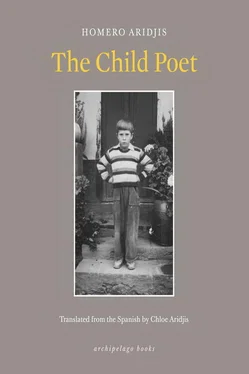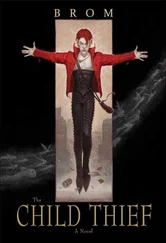One week later, on a Wednesday afternoon, they killed him.
It was near the railway station, as he was returning to the village on horseback after having paid a visit to one of his lovers.
Riding across the plain, he’d run into a man called El Chimal, with whom he had quarreled, or thought he had quarreled, since the man was an inhabitant of the village, and the village, his enemy.
As was his custom, he started to draw his gun, albeit lazily and with scant conviction, assuming the man, since he came towards him, was going to attack. El Chimal had his gun ready beneath his poncho and was already taking aim. He shot him in the face and kept firing although the rest of the shots were lost in the air.
When the cacique fell to the ground his feet got caught in the stirrups and his horse dragged him along for fifty feet. That was how far El Chimal had to go to rip out the gold teeth and trade his donkey for the other’s chestnut horse. Then he took off.
That night soldiers from another village arrived in Contepec looking for El Chimal. But they didn’t find him. After two days they left, figuring he was gone for good, but before heading out, on orders from the governor, they galloped through the streets shooting at all the houses.
Once they’d left, the villagers threw the cacique’s body into a well and covered it with stones.
The morning they buried the cacique like that, Arturo and I went to see Juan at his house.
At the post office we saw his father hunched over a desk overflowing with papers and seals; he would hold everything close to his face to read it, as if his glasses weren’t strong enough or didn’t have prescription lenses. When we knocked on the door, Juan’s youngest sister, Anita, let us in without saying if he was home or not. We looked for him in the patio, in his room, in the kitchen. With a sleepy expression and without a word, she watched us come and go. When finally we asked her whether Juan was home, she replied in a voice scarcely audible due to shyness that he’d gone out and would be home later.
So we leaned against a column in the porch surrounding the patio and watched Anita in her yellow apron as she laid out little cups and saucers on a small table and sat an old, faded doll in a chair, oblivious to our presence, as if we were no longer there.
All of a sudden Arturo poked me with his elbow to point out that Anita, who was bending over to talk to her doll, didn’t have any panties on.
And he went over to her right away, touching her from behind with his hand. She didn’t move or say anything, only stirred a little spoon in a cup. Arturo murmured something in her ear, making her blush and stop what she was doing. He then grabbed her hand and led her to the bathroom; she followed meekly.
As they passed by he told me to keep an eye open in case someone should come. I remained there, my gaze wandering over the sunny corridor, where a solitary hen was pecking at corn or staring at the wall. They’d left the door open. Anita was on all fours with her backside in the air, while he was behind her, panting.
When he noticed me watching he said it was my turn and stood up with his trousers at his ankles like empty sacks. She looked at me with a bovine expression, waiting patiently on her knees.
I shook my head. Again I was left to keep watch in the corridor, now with two hens strutting about. He sat her on his legs and later pinned her against a wall; she followed instructions.
Finally Arturo grew tired, or bored, and came to me, saying we should go. As we went down the corridor he gave one of the hens a kick. Anita was left sitting on the toilet seat peeing, with a sad, distant look on her face, as if she didn’t realize what she’d just done with Arturo, and that we were now leaving.
Across from the post office, on a bench, an old man was singing in a shrill voice of moans and wailing:
Trees cry for rain
And mountains for wind …
Strumming at his guitar:
And so my eyes cry
For you, darling beloved .
As Arturo walked away I went up to listen to the old man, and noticed that while singing all that moved were his hands and his lips; he was sitting so stiffly, he looked sculpted.
His face red and pockmarked, he resembled an ancient idol, carved out of mud, time, and suffering:
In front of me there is an angel
Looking at me with your eyes
I want to speak but cannot ,
My heart sighs .
When I thought he’d finished his song, I asked him where he came from and what he was singing but he didn’t answer or even look at me and continued:
Come see, and come see ,
Come see, and we shall see
The love that we two share
Come, let us be united .
Suddenly he fell silent and began to listen alertly.
That’s when I realized he was blind.
An old woman was approaching between the plots of grass, walking so slowly she never finished arriving, so short were her steps and so frequent her stops to rest.
From up close, leaning on her cane she looked weary, poor, and troubled. She turned to me as if to speak, but it seemed her voice would never emerge as her lips fretted over the word about to be uttered.
After a while she sat down and smiled at me, displaying a lone tooth, her face now wearing a happy expression.
She told me, albeit briefly since it distressed her to speak, that they’d come to the village that morning to see a brother who was ill. They felt too tired that afternoon to return on foot to their home, which lay in another village, and would I help them with the bus fare.
So I slid my hand in my pocket, and with a quick, timid movement as if to hide from her what I was doing, I pulled out the five pesos I had. Then off they went, the old man’s shoes so worn he might as well be walking barefoot, for his feet slipped out with every step.
They headed for the market, where some people with scant cash bought a roll or an orange to stave off hunger, staring at the fruit sellers with large, exhausted eyes, or licking a banana peel to the point of transparency.
Beneath the buzzing of flies, skinny dogs lay stretched out in front of closed butcher stalls, and a poor boy had been sitting on a stone for hours.
Occasionally a woman bought tomatoes at a stand, amid the silence of the vendors, who looked half asleep in their vigil over nonexistent customers.
My aunt Inés was going deaf. They operated on her and she ended up completely deaf. When I visited her in her hospital room she read the How are you? on my lips with as much enthusiasm as if I’d brought good news regarding her health. The truth is, she looked like a survivor and reacted to any abrupt movement with alarm, as though it threatened to upset her equilibrium. She’d already acquired that expression some deaf people have, midway between anxiety and disorientation, similar to the expression of sailors who step ashore after months at sea, the isolation they endured written on their faces and patent in their very way of walking.
With her elderly body and virgin heart, she had the face of a sufferer, of a suffering bird. In company she would move her lips in silence, repeating to herself what she’d read on the lips of others.
At meals, people often forgot about her and spoke among themselves without giving her the chance to read their lips, for when she looked at them they would turn their heads away.
When my grandmother died, Aunt Inés inherited the house where she lived. Unmarried, and confined to solitude by her deafness, she spent her days with a few books, reading one after the other in turn. She only interrupted her reading to write letters to suitors in Guadalajara, San Luis Potosí, and Mérida. Yet she never met any of them, for she endlessly postponed their dates in equidistant cities where the encounters were meant to take place. She became the sempiternal “Sentimental Young Woman” or the “Disappointed Blonde,” until the letters she received weekly from the “Gentleman from the North” and the “Lonely Man from Chiapas” grew scarcer by the month until after a year or two they stopped arriving altogether.
Читать дальше












